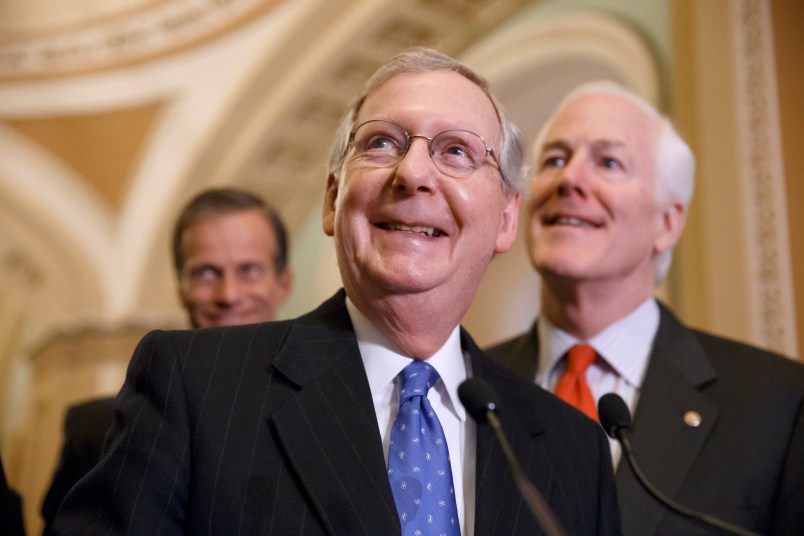The thinking is so ingrained now that it seems superfluous to point it out: Republicans are convinced that Obamacare’s unpopularity will propel them to midterm victories in November, enough to take back control of the Senate and therefore Congress. Simple as that.
“I don’t think there’s any serious observer that believes Democrats can take the House, and the Senate is slipping away from them,” Republican National Committee Chairman Reince Priebus said last week. “That’s because Americans are hurting from this law.”
But a new survey from the Kaiser Family Foundation might bring the GOP’s certainty into question: 53 percent of Americans, including 51 percent of independents, say they’re tired of debating Obamacare and think that the country should focus on other issues.
Even among Republicans, the numbers are almost evenly split: 47 percent are tired of the debate, while 49 percent think it should continue.
Democratic operatives have long told TPM that they’re skeptical about claims that Obamacare will be the defining issue of 2014. The law’s unpopularity surged during HealthCare.gov’s disastrous launch last October, but, as the Kaiser poll indicates, its approval and disapproval ratings are returning to pre-launch levels.
“The only trend we’re seeing in the Obamacare debate is that more and more voter fatigue has set in,” Matt Canter, deputy executive director for the Democratic Senatorial Campaign Committee, told TPM earlier this month. “We’re seeing more and more voters say that they are sick and tired of wasting time and energy on this debate.”
Now there are reasons why Obamacare could be an asset for Republicans in November, but it’s probably not because their position will win over the middle segment of voters and swing elections in their favor that way.
Rather, talking up Obamacare’s problems is more likely to be a means of ensuring that the conservative base turns out at the polls. Polling has found that people who support repealing the law are more likely to say that they’ll definitely vote and that health care will be a major factor. Democratic strategists privately acknowledge that health care is more likely to motivate Republican voters.
“People strongly believe that it’s being used for base intensity, for driving base turnout,” Stan Greenberg, a top Democratic pollster, told TPM. “People are very alert to that.”
In some races, where Democrats are defending seats in deep-red states, bringing the base to the ballot might be enough for Republicans to win seats. In others, however, where persuadable voters might be key — think North Carolina, where Democrats actually hold a voter registration advantage — the new findings from Kaiser raise doubts about whether the law will be the election elixir that the GOP seems so confident it will be.
The 2014 fundamentals could still be enough to get Republicans over the hump, but those exist independently of the law.
And if the Democrats can hold onto a couple of those key battleground seats, perhaps thanks in part to this Obamacare fatigue, then they’ll keep control of the Senate.






